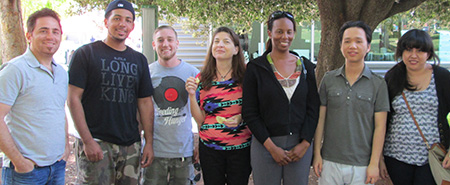eNews Edition: Summer 2014

Housed in an unassuming nook on the Oviatt Library’s Garden Level, the staff of the Universal Design Center (UDC) works to ensure that the campus web environment is usable and accessible to everyone. The key underlying principle of universal design is that all individuals, regardless of disability, should have access to information. The UDC works to ensure that web-based applications and instructional materials are accessible to individuals with any number of various processing styles or physical characteristics. UDC Program Manager Sue Cullen says, “A difference in processing ability or physical ability is only one of the many possible characteristics an individual may have and should not define who they are, nor should it limit their access to technology.” Designing universally open pathways to technology is vital work that supports the mandates laid out in the California State University (CSU) system wide Accessible Technology Initiative (ATI), The Americans with Disabilities Act of 1990 (ADA), and Sections 504 and 508 of the Rehabilitation Act of 1973.

Although compliance laws are important, they are not the UDC’s prime motivator. Cullen says, “Our goal has always been: to provide easily accessible tools; to support excellent experiences for all students, staff, and faculty; and to give everyone a sense of inclusion and an opportunity to succeed.” To that end, the UDC provides a long list of services including: responding to accessibility and usability policy-related questions; guidance on compliance related to procurement of campus software; and compliance testing of websites, software, and electronic devices. Because every member of the CSU community is charged with applying the goals set forth in ATI, the UDC is an invaluable resource for not only the CSUN community, but also for sister CSU campuses who may not have their own dedicated centers for this purpose. The UDC offers workshops for faculty and staff on how to create documents and instructional materials that are compatible with universal access goals. The Center also provides training and consultation on how to evaluate web accessibility and training for those who are interested in designing-in accessibility to new web pages and web applications.

The CSU Chancellor’s Office describes the universal design movement in architecture and product development as “an approach to the design of products and services to be usable to the greatest number of people regardless of ability, age, or situation.” The CSU website contains some compelling information on ATI and universal design standards, including a video series called From Where I Sit, which profiles 8 inspirational stories about the kind of unique challenges that potentially may be alleviated by the continued incorporation of universal design concepts. Another video spotlights former California Supreme Court Justice and current United States Ambassador to Belize Carlos Moreno, who congratulates the CSU on implementing the ATI and shares his very personal stake in the success of the initiative.
Continuing to clear universally accessible pathways to knowledge is indeed a shared responsibility. One of the key expectations expressed in the Oviatt Library’s vision statement is an unwavering dedication to support technology and delivery methods that ensure efficient access to information resources. In addition, the Library’s mission statement recognizes that the information needs of CSUN’s campus community are highly diverse. It makes perfect sense that – like many of the other valuable resources on campus – the UDC is housed in the Oviatt. The Library is proud of its ongoing partnership with the UDC, and happy that this very important center has found its home in the heart of the campus.


